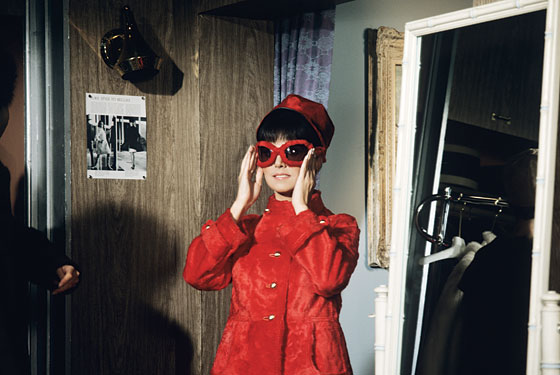 |
Marlo Thomas as That Girl, 1968.
(Photo: ABC/Retna) |
Joe Adalian: So what makes a show New Yorky anyway?
Damon Lindelof: There is a New York sense of humor that we’ve probably all experienced. People who don’t have it call it cynical …
Phil Rosenthal: Or Jew! [Laughter]
Lindelof: I’m glad you said it before I did.
Rosenthal: That’s how letters to us would begin whenever they didn’t like something: “Dear Jew.”
Lindelof: Nice. I feel like The Honeymooners had a New York sense of humor that I Love Lucy and Dick Van Dyke did not. The thing about The Honeymooners was, it could be mean!
Adam Scott: He did shitty stuff sometimes. He always figured it out and apologized, and they kissed at the end—but he was kind of a dick! And it was great!
Nina Tassler: You always got the sense that this was what life was like—apartment living, you know.
Lindelof: The window! I mean, the window was such …
Tassler: The window was everything.
Rosenthal: Looking out on other buildings.
Tassler: And Norton would walk in and out. No one knocked. You left your doors open.
Adalian: All in the Family and The Odd Couple also captured that sense of city life, no? Or at least the people living in the city.
Lindelof: The show that I liked more was All in the Family. It felt like on The Odd Couple, the conflict was always fake mean. But the conflicts on All in the Family somehow felt very, very real to me. Archie Bunker fundamentally believed his own ideas about race and his attitudes toward his son-in-law. The New York thing is the meanness, and the reality, and then pathos at the end. If you basically say, “This guy is anal-retentive, and this guy is a slob,” you could put Felix and Oscar almost anywhere and still have a comedy. But Archie had to be in New York.
Adalian: Somebody want to speak up for The Odd Couple?
Rosenthal: What I loved about Felix Ungar, aside from the brilliance of Tony Randall, is that he was another kind of New Yorker you don’t really see that much till then, which is the pseudo-intellectual. The contrast of that guy with the lowbrow Oscar made for a very good New York conflict.
Tassler: The Odd Couple felt like it was Manhattan and Archie was out in Queens. So you had …
Rosenthal: Yes! Two different New Yorks! Taxi is one of my all-time favorites, but I really believe it could have taken place in any city.
Scott: But Taxi was about the eclecticism that you find in New York. I mean, you get all kinds, and they were all thrown into a garage together. I mean, Andy Kaufman, Christopher Lloyd: These are people you see walking down the street in New York.
Adalian: We haven’t talked dramas yet, but Kojak and Baretta are certainly two quintessential New York characters.
Tassler: These guys were larger than life. They really reflected your cop as hero in New York.
Adalian: If we’re building this lexicon of adjectives, “tough” is definitely one of them.
Lindelof: And there’s a difference between tough and no-nonsense. Whereas Dragnet is just the facts, ma’am, Baretta would friggin’ punch you in the face.
Adalian: We’ve been talking prime-time, but Letterman and Saturday Night Live are pretty essential New York shows.
Rosenthal: Ed Sullivan, Late Night, SNL, the Today show. These shows at their best remind you that New York is the center of the world—where live TV started.
Lindelof: Let’s just ask a hypothetical question: What would happen if Lorne Michaels announced that he was moving SNL? To anywhere: Chicago, L.A., Vancouver. There would be such an outrage. Why? Because it’s an institution of New York. “Live from New York, it’s Saturday night.”
Rosenthal: Right over there.
Adalian: We’ve talked about the gritty New York. But there’s this fantasy version of the city, going all the way back to maybe That Girl.
Tassler: Being a young girl, watching Marlo Thomas living out her dreams and having boyfriends and a job and a career. Total and complete wish fulfillment.
Rosenthal: There’s a straight line from that to Sex and the City, right?
Tassler: [SATC] completely embraced the culture of New York. The kind of sheets you bought, where you had your hair cut—it’s in every frame of film, it’s in virtually every line of dialogue. You cannot separate New York from that show.
Lindelof: It was also the very definition of watercooler television: If I wanted to get laid when I was in my twenties, I had to watch Sex and the City.
Scott: It was an almost-voyeuristic look into the mind of the modern female, at the time.
Lindelof: It wasn’t just, “Could you believe what Carrie did or said last night?” It was “Could you believe the purse that Carrie had?” That idea of the fashion world, the Anna Wintour of it all—it can’t be Chicago. That said, I’d say that 25 percent of the marriages that happened while Sex and the City was on will end in divorce because of Sex and the City.
Adalian: Friends also fits into the young, single, free fantasy version of New York.
Rosenthal: A fantasy on every level.

